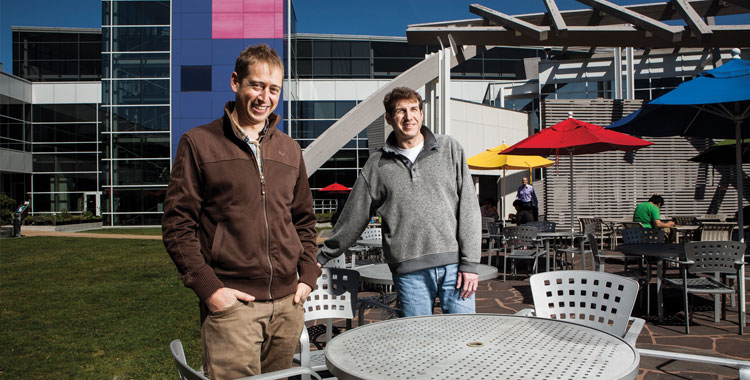British writer and scientist Arthur C. Clarke once wrote that “any sufficiently advanced technology is indistinguishable from magic.”
And for many of us, that’s exactly how the beeps and pings and connecting dings that keep our schedules, steer our cars to the right destination, and even maintain our bonds with family and friends over great distances seem to work. Like magic.
But to the humans behind the technologies – including Silicon Valley-based UMBC alumni at Apple and Google – it’s anything but abracadabra. It’s a combination of hard work, entrepreneurial drive and visionary imagination at its geekish best.
Let’s meet some of the minds behind the magic of our technologies.
by Jenny O’Grady
Photos by Gabriela Hasbun
Stroll down the yellow brick walkway that leads to Building 43, and a trio of girls on colorful bikes rides by, dinging their handlebar bells and singing “Hello!”
Take a right, and you’re in a garden of busts that depict everyone from Lloyd Bridges to Jacques Cousteau. Beyond that, a T-Rex skeleton feasts on helpless plastic pink flamingos. There’s a delicious savory breeze – does it come from one of the free cafeterias or the employee-run herb garden? – and a burst of laughter from a group of young engineers playing beach volleyball nearby.
Oh, right: and today’s free haircut day. That’s life in the Googleplex for you.
Google’s headquarters in Mountain View, California, is often depicted as a Willy Wonka’s Chocolate Factory of high-tech geekdom. It’s frequently listed on Top 10 lists of amazing workplaces. But what’s it really like to work at a company with a product so popular that it’s become a verb?
“It is very good to foster a culture where people are engaged, want to be at work, and that allows you to concentrate your time on what you’re trying to do in the day,” says Jeffrey Burgan ’83, computer science, director of network engineering for Google Access, which delivers high speed internet. “People work very hard here, so if the place can take the burden off in other areas – like get an oil change or a haircut, or to have washers and driers so people can do their laundry – it definitely helps.”
Google is known as much for the sheer difficulty of its confounding job interviews as it is for the replica of SpaceShipOne in its lobby. The secret to the company’s success seems to lie in its careful balance of work and play, and other UMBC alumni at Google agree that its unique culture pushes them to be more creative and constructive.
Jeetendra M. Soneja M.S. ’04, computer science, is the tech lead for Google Analytics API. He works in an outlying office, but finds the company culture persists across Google’s many campuses.
“One thing that is common across all the Google offices all over the world is the friendly and helpful nature of the fellow Googlers,” he says. “This leads to a very healthy working environment and is one of the best things why I love working here. The work environment is also fun and relaxing, and yet focused and one that promotes and rewards innovation.”
Robert Banz ’95, computer science, has worked as a site reliability engineer at Google for four years. (“We make sure Google is ‘always on,’” he says.) Before that, he worked at UMBC, which gives him a bit of special perspective about what’s extra cool about working at the Mountain View campus.
“Everyone says it’s the free food options, so I’ll go with something else. I’d say I was surprised how much it felt like a university campus,” he said.
Banz also believes the atmosphere of Silicon Valley is a significant influence on the famed Google culture. “Silicon Valley and San Francisco, but really the entire Bay Area, has this amazing critical mass of passionate creative, scientific, and engineering talent,” he says. “These groups mix socially; mutual curiosity leads to unique ideas. I think that’s the secret to the creative engine, and the source of very engaging and entertaining conversation.”
Sandor Dornbush M.S. ’06, computer science, sometimes runs to work with his black lab, Coltrane. Other times, he takes the free Google shuttle. Today, he wheels his bike into a meeting room playfully covered in a soft padded material. Photos of the Burning Man festival hang nearby.
“Despite all the games, and the food and everything, I honestly don’t think I’ve played a single game of pool in my six years here,” says Dornbush, an engineer for Google Play, who knows his work ultimately comes first.
“People talk about the Google 15 (because of the free food), but I’ve actually found the opposite,” Dornbush says. “For the first time, many people have access to really good food, and they have access to the gym, and they see people around them taking care of themselves, and they start to drop pounds. So despite the fact that there’s all this free stuff, people work really hard. And it’s a culture that encourages that.”


